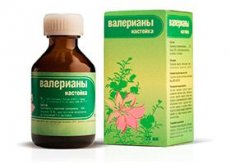Medical expert of the article
New publications
Preparations
Valeriana
Last reviewed: 23.04.2024

All iLive content is medically reviewed or fact checked to ensure as much factual accuracy as possible.
We have strict sourcing guidelines and only link to reputable media sites, academic research institutions and, whenever possible, medically peer reviewed studies. Note that the numbers in parentheses ([1], [2], etc.) are clickable links to these studies.
If you feel that any of our content is inaccurate, out-of-date, or otherwise questionable, please select it and press Ctrl + Enter.

Valerian is a sedative and anxiolytic agent of plant origin based on the roots and rhizomes of Valeriana officinalis (Valeriana officinalis). Valerian is a herb whose root contains active ingredients that include valepotriates and spicy odiferous oils.
Indications Valeriana
Valerian is used as a sedative and a means to improve sleep; It is very popular in Europe.
The indications for which the use of Valerian and all drugs based on it are recommended include functional disorders of the central nervous system and the cardiovascular system:
- nervous overexcitement, increased emotional irritability and anxiety;
- neurotic states, including vascular spasms of the heart and tachycardia;
- sleep disturbances (difficulty falling asleep, insomnia);
- neurocirculatory dystonia.
Also, the drug has antispasmodic and muscle relaxant properties, and can be used for gastrointestinal spasms of various etiologies (in particular, associated with spastic colitis), as an anticonvulsant for epilepsy, for bronchospasms (histamine and antigen-induced).
Pharmacodynamics
The mechanism of the sedative effect of Valerian is based on the biochemical properties of the active substances contained in the roots and rhizomes of Valerian drug (Rhízoma cum radicibus Valeuianae): mono- and triterpenes, iridoid tri-esters (valepotriates), flavonoids (hesperidin, 6-methyl-apigenin, syphidophenine, validotriates, flavonoids (hesperidin, 6-methyl-apigenin, lymphoidin, iridoidal tfereters) also alkaloids (valerian, valerin, actinidine, hatinin, isovaleramide).
The roots contain an essential oil, which contains biologically active sesquiterpenes (valeric and isovaleric acid), borneol, camphene, pinene, pyrril-alpha-methyl ketone.
Drug valerian alkaloids are structurally similar to the psychoactive anxiolytic substances of the benzodiazepine group and interact with cellular receptors for GABA (gamma-aminobutyric acid), serotonin and adenosine, which reduces the excitability of peripheral neurotransmitters and contributes to increased resistance to the excitation of CNS neurons.
The antispasmodic effect of valerian preparations is associated with their ability to reduce the activity of the pituitary hormone vasopressin.
 [9]
[9]
Dosing and administration
Valerian tablets are taken orally (before meals) - one tablet twice a day. In cases of problems with falling asleep - one or two pills are taken half an hour before bedtime.
Take the tincture after a meal - 20-30 drops, and adolescents over 12 years old - 15 drops each. The number of doses and the duration of Valerian's use is determined by the attending physician.
Use Valeriana during pregnancy
Since information on the safety of Valeriana for pregnant women is insufficient, it is not recommended to use this drug during pregnancy and lactation.
Side effects Valeriana
Valerian may prolong the effect of other sedatives (such as barbiturates) and adversely affect driving or other actions that require caution.
The use of Valerian can be accompanied by side effects in the form of increased drowsiness, a state of lethargy and a feeling of general depression. In some cases, this drug can cause headaches and night terrors.
Valerian is able to reduce muscle tone, physical performance and dull attention (which should be borne in mind when driving vehicles and mechanisms).
 [15]
[15]
Overdose
Exceeding the dose of Valeriana enhances its side effects, and also causes a feeling of discomfort in the stomach; nausea and vomiting may occur. Overdose requires discontinuation of the drug and symptomatic treatment.
 [21]
[21]
Interactions with other drugs
Attention!
To simplify the perception of information, this instruction for use of the drug "Valeriana" translated and presented in a special form on the basis of the official instructions for medical use of the drug. Before use read the annotation that came directly to medicines.
Description provided for informational purposes and is not a guide to self-healing. The need for this drug, the purpose of the treatment regimen, methods and dose of the drug is determined solely by the attending physician. Self-medication is dangerous for your health.

